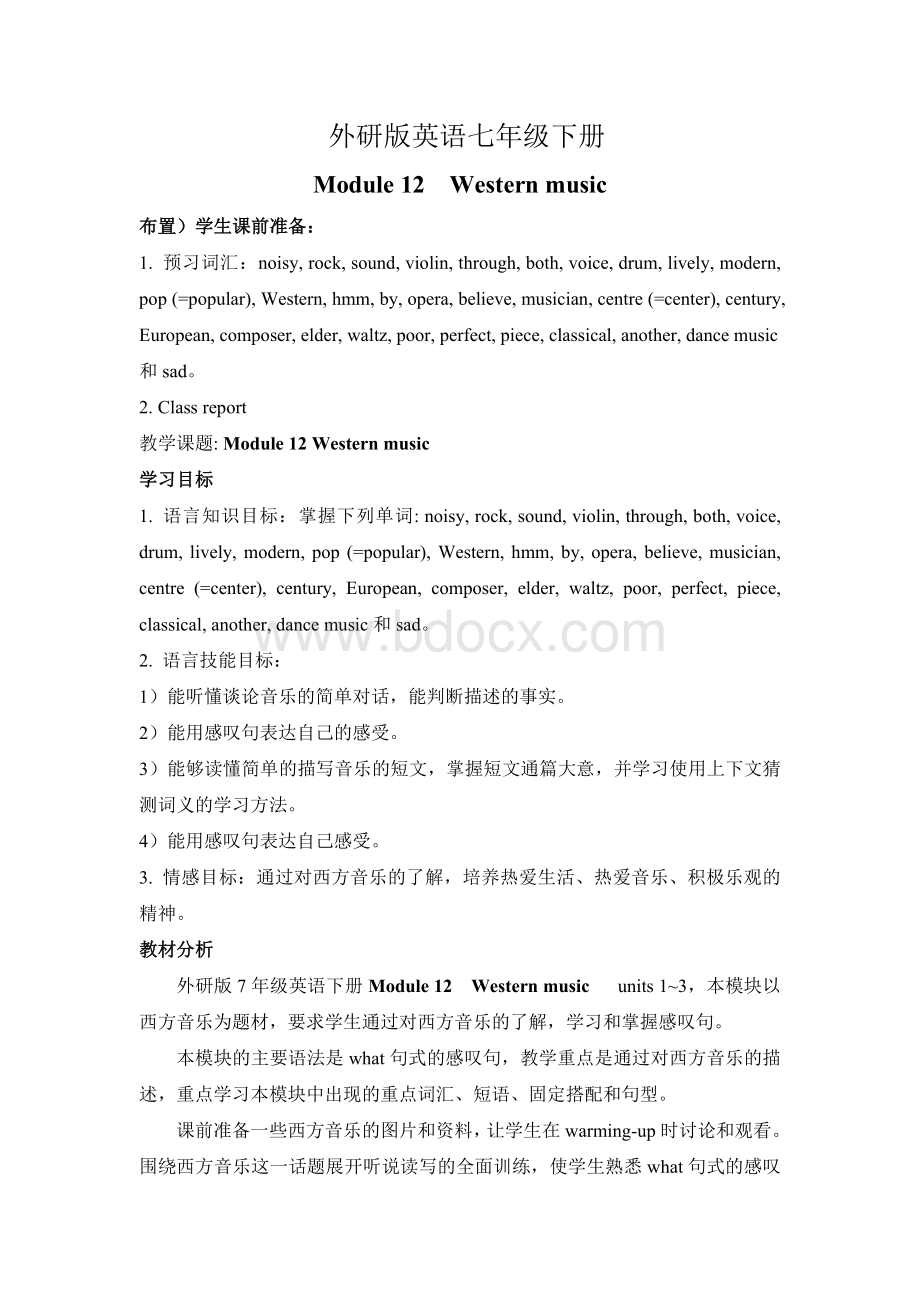 英语外研版七年级下册【教案】Module-12-Western-music.doc
英语外研版七年级下册【教案】Module-12-Western-music.doc
- 文档编号:30870357
- 上传时间:2024-09-12
- 格式:DOC
- 页数:11
- 大小:67.50KB
英语外研版七年级下册【教案】Module-12-Western-music.doc
《英语外研版七年级下册【教案】Module-12-Western-music.doc》由会员分享,可在线阅读,更多相关《英语外研版七年级下册【教案】Module-12-Western-music.doc(11页珍藏版)》请在冰豆网上搜索。

外研版英语七年级下册
Module12Westernmusic
布置)学生课前准备:
1.预习词汇:
noisy,rock,sound,violin,through,both,voice,drum,lively,modern,pop(=popular),Western,hmm,by,opera,believe,musician,centre(=center),century,European,composer,elder,waltz,poor,perfect,piece,classical,another,dancemusic和sad。
2.Classreport
教学课题:
Module12Westernmusic
学习目标
1.语言知识目标:
掌握下列单词:
noisy,rock,sound,violin,through,both,voice,drum,lively,modern,pop(=popular),Western,hmm,by,opera,believe,musician,centre(=center),century,European,composer,elder,waltz,poor,perfect,piece,classical,another,dancemusic和sad。
2.语言技能目标:
1)能听懂谈论音乐的简单对话,能判断描述的事实。
2)能用感叹句表达自己的感受。
3)能够读懂简单的描写音乐的短文,掌握短文通篇大意,并学习使用上下文猜测词义的学习方法。
4)能用感叹句表达自己感受。
3.情感目标:
通过对西方音乐的了解,培养热爱生活、热爱音乐、积极乐观的精神。
教材分析
外研版7年级英语下册Module12Westernmusicunits1~3,本模块以西方音乐为题材,要求学生通过对西方音乐的了解,学习和掌握感叹句。
本模块的主要语法是what句式的感叹句,教学重点是通过对西方音乐的描述,重点学习本模块中出现的重点词汇、短语、固定搭配和句型。
课前准备一些西方音乐的图片和资料,让学生在warming-up时讨论和观看。
围绕西方音乐这一话题展开听说读写的全面训练,使学生熟悉what句式的感叹句并会使用。
教学方法
以说为主要教学方式,以讨论为主要方法,通过同桌讨论和小组以及全班讨论,让每个学生充分练习口语和说的能力,并将听说读写有机地贯穿一体。
设立一些语言环境,结合自己或他人的旅游经历以及旅游景点,最后一起学习重难点,为突破重难点做一些课堂和课后的练习。
教学过程
Unit1It’ssobeautiful!
Step1:
Warming-upandLeadin
TogivesomepicturesaboutWesternsingertostudents.SuchasMichaelJacksonandtheMusikvereininVienna.Letthemwatchandtalkaboutthem.
Step2:
Workinpairs.Listenandnumberthewordsasyouhearthem.
()lively()modern()music
()noisy()pop()rock
()sound()violin()Western
Keys:
lively–7modern–5music–1noisy-9pop–8rock–6sound–3violin–4Western-2
Step3:
Workinpairs.AnswerthequestionsabouttheconversationinActivity1.Andthenlistenagainandcheck.
1.WhichmodernmusicdoesTonylike?
2.WhatdoesTony’smumthinkaboutrockmusic?
3.Whydoesn’tTonyliketraditionalWesternmusic?
4.WhichmusicdoesTony’sdadthinkistoonoisy?
Keys:
1.Helikespopandrockmusic.
2.It’slively.
3.It’stooslow.
4.Hethinkspopmusicistoonoisy.
Step4:
ListenandreadtheActivity3.Andthencheck(√)thetruesentences.
()1.They’relisteningtoWesternmusic.
()2.TonyknowslittleaboutStrauss.
()3.StrausswasborninthecapitalofAustralia.
()4.TheBlueDanubeispopmusic.
()5.LinglingenjoysBeijingoperaverymuch.
Keys:
1.√2.√3.×4.×5.√
Step5:
TostudyEverydayEnglish.
¤Whatabeautifulcity!
¤I’mafanofrockmusic.
¤Giveusabreak!
¤Idon’tbelieveit!
Step6:
Checkthetypesofmusicthestudentslike(√)anddon’tlike(x).
name
music
Tony
Lingling
Betty
Daming
traditionalWesternmusic
√
√
Beijingopera
√
pop
√
√
rock
√
Step7:
Completethesentenceswiththecorrectformofthewordsfromthebox.
believebothdrumGermannoisyvoice
1.Strausswasn’t______.HecamefromAustria.
2.Damingthinksthe______inrockmusicaretoo______.
3.Tonycan’t______thatDamingdoesn’tlikerockmusic.
4.Bettylikes______traditionalWesternmusicandpopmusic.
5.Tonythinksthesoundofthe______inBeijingoperaisverydifferent.
Keys:
1.German2.drums;noisy3.believe4.both5.voice
Step8:
Completethesentencesaboutyourself.
1.Myfavouritemusicis…
2.Ilikeitbecause...
3.Myparentslike...
Step9:
Listenandread.
1.Whatabeautifulcity!
2.It’ssobeautiful!
3.Ilovehismusic!
4.Listentothis!
Step10:
Workinpairs.Askandanswerthequestionsaboutthemusicyoulikeordon’tlike.
—Whatmusicdoyoulike?
—Ilikepop.It’slivelyandgoodtodanceto,butIdon’tlikerock.It’stoonoisy.Whataboutyou?
Step11:
Studythefollowingnewwords.
noisy,rock,sound,violin,through,both,voice,drum,lively,modern,pop(=popular),Western,hmm,by,opera,believe
Step12:
ExplainandstudytheimportantanddifficultpointsofUnit1Module12.
1.noisy—quiet
e.g.Thiscityisnotquiet,it’snoisy.
2.Differencebetween“sound”and“voice”.
e.g.Atnightsheheardastrangesound.
Thegirlhasasweetvoice.
3.Theusageofword“by”.
e.g.Youcangettherebybus.
ThepieceiswrittenbyMozart.
4.Giveusabreak!
Step13:
Homework
ReviewandrecitetheimportantpointsofUnit1.
Unit2ViennaisthecentreofEuropeanclassicalmusic.
Step1:
Warming-upandLeadin
TogivesomepicturesandvideosaboutStraussWaltztostudents.LetthemwatchandthentalkaboutWesternmusic.
Step2:
Workinpairs.LookatthepicturesofActivity1anddescribeit.Usethewordsfromtheboxtohelpmystudents.
concertmusicianpianoviolin
Step3:
ReadthepassageofActivity2andcheck(√)thetruesentences.
1.ManymusicianscametostudyandworkinVienna.
2.Strausstheyoungerplayedthepiano,theviolinandthedrumsattheageofsix.
3.Mozart’sfamilytookhimaroundEurope.
4.Thefather,JohannStrauss,diedin1791.
5.MozartwroteTheBlueDanube.
Keys:
1.√2.×3.√4.×5.×
Step4:
Answerthefollowingquestions.
1.WhereisVienna?
2.WhatmusicdidJohannStrausstheelderwrite?
3.HowmanywaltzesdidJohannStrausstheyoungerwrite?
4.WhenwasMozartborn?
5.HowoldwasMozartwhenhedied?
Keys:
1.ItisinthecentreofEurope.
2.Hewrotemusicfortraditionaldances,calledthewaltz.
3.Hewroteover150waltzes.
4.Hewasbornin1756.
5.Hewas35.
Step5:
CompletethepassageofActivity4withthecorrectformofthewordsfromthebox.
anotherelderEuropeanperfectpoorpopular
BothStraussthe
(1)______andStrausstheyoungerwrotesomevery
(2)_______music.(3)_______successfulcomposerfromViennawasMozart,buthebecamevery(4)______anddiedattheageofthirty-five.ManypeoplethinkMozart’smusicis(5)_______.Allthreeweregreat(6)_________musicians.
Keys:
1.elder2.popular3.Another4.poor5.perfect6.European
Step6:
UsethenotetowriteapassageabouttheChinesecomposerXianXinghai.
¤XianXinghai
¤famousforthesongTheYellowRiver
¤wroteitin1939inonlysixdays
¤oneofthegreatcomposersofclassical
andtraditionalmusic
¤borninMacao,China,1905
¤diedyoung,1945
¤calledthe“People’sMusician”
¤usedtraditionalChinesemusic
¤studiedinParis
¤songsarestillpopulartoday
Theycanwritelikethis,
XianXinghaiisoneofthegreatcomposersofclassicalandtraditionalmusic.Hewasbornin...
Step7:
StudythenewwordsandexpressionsofUnit2Module12.
musician,centre(=center),European,composer,century,elder,waltz,poor,perfect,piece,classical,another,dancemusic
Step8:
ExplainandstudytheimportantanddifficultpointsofUnit2.
1.musician~music
2.European~Europe
3.poor~rich
e.g.:
Thisgirlispoor,she’snotrichatall.
4.theusageofword“piece“.
5.theusageofexpression“ontheriver...“.
e.g.:
HishometownisasmallcityontheChangjiangRiver.
6.theusageofword“century“.
7.theusageofexpression“notonly...butalso...“.
8.theusageofword“like“.
e.g.:
Hemovesandtalksjustlikehisfather.
I’dlovetobeabletosinglikeSarahBrightman.
Step9:
Homework
ReviewandrecitetheimportantpointsofUnit2.
Unit3Languageinuse.
Step1:
Warming-upandLeadin
TogivesomepicturesandvideosaboutWesternmusictostudents.SuchasMichaelJackson.LetthemwatchandtalkaboutitandWesternmusic.
Step2:
Languagepractice
Whatabeautifulcity!
DoyouliketraditionalWesternmusicorpopmusic?
Step3:
Writequestions.
you/like/pop/traditionalmusic?
→
Doyoulikepoportraditionalmusic?
1.(be)/Strauss/German/Austrian?
______________________________?
2.(be)/this/pop/rock?
______________________?
3.(they)/they/traditionalmusic/modernmusic?
____________________________________?
4.she/play/piano/violin?
____________________________?
5.where/(can)we/hear/rockmusic
/in/NewYork/London?
___________________________________?
Keys:
1.IsStraussGermanorAustrian?
2.Isthispoporrock?
3.Dotheyplaytradtionalmusicormodernmusic?
4.Doesheplaythepianoortheviolin?
5.Wherecanwehearrockmusic,inNewYorkorinLondon?
Step4:
Writeexclamationswith“What(a)…!
”
Thisisbeautifulmusic.→
Whatbeautifulmusicthisis!
1.Viennaisabeautifuloldcity.
_________________________!
2.Itisasuccessfulconcert.
______________________!
3.Theyareplayingnoisydrums.
___________________________!
4.Itwasawonderfulparty.
______________________!
5.Mozartisafamouscomposer.
__________________________!
Keys:
1.WhatabeautifuloldcityViennais!
2.Whatasuccessfulconcertitis!
3.Whatnoisydrumstheyareplaying!
4.Whatawonderfulpartyitwas!
5.WhatafamouscomposerMozartis!
Step5:
Putthewordsintothecorrectcolumn.
drumfanmusicianpianopoprocktraditionalviolin
Typesofmusic
Instruments
People
pop
rock
traditionalmusic
drum
piano
violin
fan
musician
Step6:
CompletetheconversationofActivity4withthecorrectfromofthewordsfromthebox.
comegivehearlearnlovewrite
Lingling:
Thisisbeautifulmusic.Whowroteit,Betty?
Betty:
Beethovenwroteit.Hewasagreatmusician.I
(1)______hismusic.
Lingling:
Metoo.DidheliveatthesametimeasMozart?
Betty:
Yes,hewasbornin1770andbeganto
(2)______musicatanearly
age.He(3)______hisfirstpianoconcertwhenhewasonlyseven.
Lingling:
Whendidhestartto(4)_____music?
Betty:
Veryearly.Hisfirstwork(5)______outbefor
- 配套讲稿:
如PPT文件的首页显示word图标,表示该PPT已包含配套word讲稿。双击word图标可打开word文档。
- 特殊限制:
部分文档作品中含有的国旗、国徽等图片,仅作为作品整体效果示例展示,禁止商用。设计者仅对作品中独创性部分享有著作权。
- 关 键 词:
- 教案 英语 外研版七 年级 下册 Module 12 Western music
 冰豆网所有资源均是用户自行上传分享,仅供网友学习交流,未经上传用户书面授权,请勿作他用。
冰豆网所有资源均是用户自行上传分享,仅供网友学习交流,未经上传用户书面授权,请勿作他用。


 党组织、党员联系服务师生工作制度.docx
党组织、党员联系服务师生工作制度.docx
 物流与供应链管理 第七章 供应链综合计划.pptx
物流与供应链管理 第七章 供应链综合计划.pptx
 回弹仪检测多孔砖砖强度计算表.xls
回弹仪检测多孔砖砖强度计算表.xls
